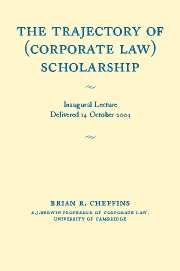 The Trajectory of (Corporate Law) Scholarship
The Trajectory of (Corporate Law) Scholarship III - Corporate law scholarship
Published online by Cambridge University Press: 06 January 2010
Summary
A Historical Sketch
Corporate Personality
During the nineteenth century, legislatures in the United States, Britain and other jurisdictions began to enact ‘modern’ corporate laws that established straightforward procedures for incorporating business enterprises. The first major theoretical debate to follow this development concerned corporate ‘personality’. As legal historian Morton Horwitz has observed, ‘(b)eginning in the 1890s and reaching a high point around 1920, (this was) a virtual obsession in the legal literature’.
Three camps of opinion could be discerned. First, the ‘fiction’ or ‘artificial entity’ theory held that corporate organisations were mere abstractions that owed their existence and legitimacy to an official grant of authority (a ‘concession’) from the state. Second, the contractual/association theory implied that a corporation was not a product of sovereign intervention but instead was an association constituted by the aggregation of freely contracting individuals, namely the shareholders. Third, the ‘real entity’ theory held that a corporation was not fictional but instead had a distinctive personality in the same sense that a human being does. This implied, in turn, that a corporate entity must be conceptually distinct from those owning the equity.
The discourse concerning corporate personality was, for its time, strikingly theoretical in tone and was much more international in orientation than was traditional with legal scholarship.
- Type
- Chapter
- Information
- The Trajectory of (Corporate Law) ScholarshipAn Inaugural Lecture given in the University of Cambridge October 2003, pp. 38 - 82Publisher: Cambridge University PressPrint publication year: 2004
- 1
- Cited by
